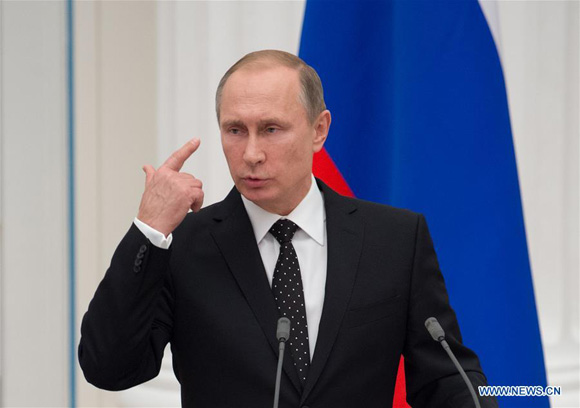Whose explanations are more persuasive?
- By Jin Liangxiang
 0 Comment(s)
0 Comment(s) Print
Print E-mail China.org.cn, November 27, 2015
E-mail China.org.cn, November 27, 2015
|
|
|
Russian President Vladimir Putin speaks during a joint press conference with his French counterpart Francois Hollande (not in the picture) after their meeting in Kremlin, Moscow, Russia, on Nov. 26, 2015. [Photo/Xinhua] |
On November 24, Turkey intentionally shot down a Russian fighter Su-24 on a bombing mission against ISIS. Shortly after that, Turkey offered some far-from-persuasive explanations. Turkey's behavior even raised questions about its stance on ISIS.
It is true that, according to international law, Turkey has the right to shoot down any foreign aircraft entering its sovereign airspace even without warning. Judging by this, if the Russian fighter was really in Turkey's air space, the downing of the aircraft would technically be legal.
However, legality does not necessarily mean legitimacy. Turkey claims the Russian fighter violated its airspace, which Russia denies. The truth, however, will not be easily available to outsiders.
Even if the Russian fighter really crossed the border, down was not necessarily a legitimate option. The border between Syria and Turkey is convoluted, making it technically difficult for any aircraft to avoid crossing it. The flight can be on the one side of the border one second, and on the other side of the border the next.
The downing was illegitimate also because there is no evidence the Russian aircraft had gone deep into Turkey's air space, and caused any material and human damage.
Turkish Prime Minister Ahmet Davuto?lu described Russia as a friend of Turkey, so how could the latter shoot down an aircraft of a friendly nation? Dubbing Russia as a friend suggests hypocrisy.
So, what are the real reasons behind the shooting? One explanation is that Russia's military involvement undermined Turkey's interests in Syria.
There are three main forces in Syria: the Syrian government led by Bashar Assad, Free Syrian Army (FSA) backed by the National Coalition and ISIS. Russia regards Assad as a staunch ally, without whom Russia might have no geopolitical influence in the Middle East; Turkey openly supports the FSA and National Coalition, whose headquarter is in Istanbul.
Turkey, together with the West and Gulf Arab states, clearly believe Assad should leave. That's not even the full story. It is also believed that Turkey has some ambiguous relations with ISIS. Some Western experts suspect Turkey wants to use ISIS to hold the Kurds in check. Kurds are actually most serious fighting force against ISIS, which occupies their lands.
These differences form the basis of the potential conflict between Russia and Turkey. Russia might be truly fighting ISIS, but it also attacks the FSA. Russia thinks both ISIS and FSA are a serious challenge to the security of Assad's regime. Russia's military actions, therefore, are against Turkish interests.






